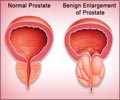Research has indicated that progress toward understanding the role of sex hormones in the growth of prostate cancer has been hindered by the lack of a suitable laboratory research model.
Research has indicated that progress toward understanding the role of sex hormones in the growth of prostate cancer has been hindered by the lack of a suitable laboratory research model.
Now researchers say they have developed the first model of hormone-induced human prostate cancer initiation and progression.Their results were presented at The Endocrine Society's 92nd Annual Meeting in San Diego.
"We hope this model will speed up the process of testing preventive therapies for prostate cancer as well as help clarify the hormonal mechanisms in the development of this cancer," said Gail Prins, PhD, a professor and reproductive physiologist at the University of Illinois at Chicago, who is a co-author of the study.
"Sex hormones—testosterone and estrogens—are involved in regulating the growth of prostate cancer, but the mechanisms are not well established," Prins said.
Currently the only available laboratory models of human prostate cancer are xenografts—cancerous human tissues grafted under the skin of animals—or "transformed" cancer cell lines containing cells that originally came from patients with prostate cancer. However, Prins said, "If you want to study the initial development of cancer—either naturally or induced—or its prevention, you cannot use a model of existing cancer, such as transformed cell lines."
To study the progression of prostate cancer from normal cells into cancerous cells requires the use of animal prostate cells. Animal models, however, do not directly mimic all aspects of human prostate cancer, experts say.
The researchers combined these human prostaspheres with embryonic cells from the prostate of a rat and then transplanted the mixed cells under the kidney capsule of mice. These transplants regenerated into normal human prostate-like tissues and secreted prostate-specific antigen (PSA), which confirmed human functionality, according to Prins.
"We were able to induce hormonally driven prostate cancer in these recombinant tissues," Prins said. "Using this model, we can follow the entire pathway of the cancer—from normal tissue to initiation and progression."
Source-Eurekalert
 MEDINDIA
MEDINDIA




 Email
Email



![Prostate Specific Antigen [PSA] Prostate Specific Antigen [PSA]](https://www.medindia.net/images/common/patientinfo/120_100/prostate-specific-antigen.jpg)






